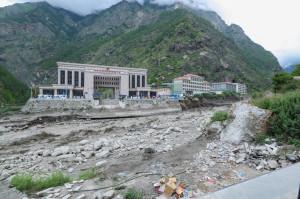Money
Farmers in Far West Nepal hit by chemical fertiliser shortage
Due to escalating global prices, the government company responsible for supplying imported fertilisers is having a hard time finding sources.
Bhawani Bhatta
Trouble is coming in bunches for farmers in far western Nepal. They have been hit by a chemical fertiliser shortage ahead of the wheat sowing season after suffering a disastrous paddy season when freak floods destroyed their standing crops last month.
Most farmers in the Far West sow their wheat crops in November after harvesting paddy, and a fertiliser crisis has prompted a frantic search for the vital inputs.
Due to escalating global prices, the government company responsible for supplying imported fertilisers has been having a hard time finding sources.
Last month’s unseasonal rains and floods damaged paddy crops worth Rs8.26 billion, the highest losses on record, according to the Ministry of Agriculture and Livestock Development.
In Kailali and Kanchanpur districts of Sudurpaschim province, the rains damaged 68,400 tonnes of paddy on 18,000 hectares. The total losses in the province have been assessed at Rs1.91 billion.
Farmers say that the warehouses of the state-owned chemical fertiliser sellers—Agriculture Inputs Company and Salt Trading Corporation—are almost empty.
They said that the shortage may not only hit the wheat crop but also hurt mustard, vegetable and banana cultivation this year.
Due to the short supply, farmers are forced to buy smuggled chemical fertilisers from India at exorbitant prices.
"Both fertilisers—urea and DAP—have been unavailable for the last four months,” said Purna Singh Saud, chairman of the Banana Producers Cooperative Association.
“I have not been able to apply fertiliser on my banana crop," Saud said, adding that farmers were using the single superphosphate sold by Salt Trading as a temporary measure. “If this superphosphate also gets finished, there will be havoc.”
Banana is cultivated on about 500 hectares in Kanchanpur.
"Farmers have started preparations to sow wheat, but there is no fertiliser," said Narayan Saud, a local farmer at Bhimdatta Municipality. “Our paddy crop was swept away by rain. Now, it seems we will not get chemical fertiliser for the winter crop.”
He lost 2 bighas of paddy to the unseasonal October rainfall.
Nepal suffered floods following the unseasonal torrential rains that started on October 17 and killed more than 100 people and inundated settlements in several districts.
Heavy rainfall is unusual in the country in October, which is traditionally outside the monsoon season.
“Even the straw we had stored for fodder was damaged by the rain. We don’t have enough to feed our cattle this year,” said Narayan Saud.
The warehouse of Salt Trading has only 700 bags of single superphosphate, while the warehouse of the Agriculture Inputs Company has been completely empty since mid-August.
"Diammonium phosphate and urea are not likely to arrive immediately," said Deepak Bhatta, chief of Salt Trading Corporation, Mahendranagar.
"We have brought single superphosphate instead of diammonium phosphate, and we are selling it now," he said. "Urea and diammonium phosphate shipments are likely to arrive after the Chhath festival," he said.
Agriculture Inputs Company has not received urea since mid-August. After the urea and diammonium phosphate brought for the paddy transplantation season ran out in mid-June, the shortage started.
"Far West Nepal was allocated a quota of 2,500 tonnes of urea, 1,800 tonnes of diammonium phosphate and 70 tonnes of potash for this fiscal year," said Bal Bahadur Shah, chief of Agriculture Inputs Company, Kanchanpur.
"Out of this allocation, 540 tonnes of diammonium phosphate and 475 tonnes of urea will be supplied in the first four months of the fiscal year ending mid-November," he said.
"We don’t have urea and diammonium phosphate in stock now,” he said. “We are expecting to receive a new quota soon," said Shah.
He added that 750 tonnes of urea and 540 tonnes of diammonium phosphate would be delivered soon.
In Dhangadhi, there is a stock of only 115 tonnes of urea. Nawal Singh Bogati, chief of Agriculture Inputs Company, Dhangadhi, said that the chances of fresh fertiliser shipments arriving were slim.
Agriculture Inputs Company sold 20,209 tonnes of urea and diammonium phosphate in Nepal's Far West in the last fiscal year.
Bogati said that this year's requirement would amount up to 30,000 tonnes. He added that 6,000 tonnes of diammonium phosphate and 5,000 tonnes of urea had been allocated for the wheat crop.
There is no other fertiliser except single superphosphate in the warehouse of Salt Trading in Dhangadhi.
Keshav Pandey, chief of the provincial office of Salt Trading in Dhangadhi, said that urea and diammonium phosphate would be delivered only after the festival which ended on Wednesday.
Wheat is cultivated on 30,000 hectares in Kanchanpur. In Kailali, wheat is grown on 34,000 hectares.




 24.79°C Kathmandu
24.79°C Kathmandu














